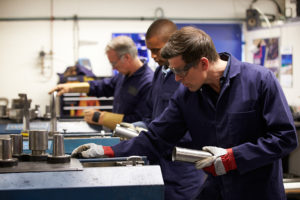Properly-Trained New Manufacturing Hires Can Help Your Bottom Line

As computer-controlled machines replace manual labor on factory floors, company leaders are hiring a more diverse set of skilled workers than ever before. Manufacturing employees must now wield a combination of skills, including troubleshooting automated machinery, reading manufacturing blueprints, and writing mechanical programming code. Many arrive on the job with newly-minted manufacturing, supply chain, or systems engineering degrees in hand. But when new hires first enter manufacturing workplaces, most don’t know the rules and procedures specific to working on that plant floor.
Some new workers may already have manufacturing backgrounds — but not the specific skills necessary to operate the machinery, robotics, and software at their new plants. And new grads often find that their college engineering programs didn’t prepare them for their real-life factory environments. Both new grads and experienced manufacturing workers climb steep learning curves in their early days with new companies.
Unfortunately, most employers lack specific training programs. According to a Machine Design article, in its 2017 Salary and Career Report survey of more than 2,000 engineers on how new talent training should be handled, “93% noted that their company does not provide training to young engineers and 61% indicated that their companies do not have mentoring programs.” Also, “Many large engineering companies do not properly train their new employees to the unique ‘ins and outs’ of their company, leaving young engineers to either sink or swim.”
But there are many reasons why properly training new hires at the outset improves the bottom line.
Properly trained new employees are worth the investment
It costs manufacturers a lot of money to hire college-educated employees, especially those with the specialized degrees necessary to operate in today’s plants. Properly training these employees from the beginning helps ensure employers get the most out of their workforce investments. Properly-trained new employees contribute to companies from the start by:
- Enhancing productivity — New workers get up to speed faster and add to their teams’ efforts.
- Reducing employee turnover — Proper training eases on-the-job frustrations for both new hires and the veteran employees responsible for assisting them.
- Saving time — The time it takes to train new hires at the beginning is less than the time it takes to pull other workers off the line to supervise and fix mistakes.
- Increasing plant safety — Properly trained new employees are more likely to practice safe methods and prevent injury.

How can manufacturers equip new hires with the training they need?
The Oregon Manufacturing Employee Partnership (OMEP) outlines some best practices for company leaders who want to arm new employees with the information they need via solid training programs. Manufacturers can take some general first steps:
- Define company-specific skills necessary to perform certain roles.
- Determine what training gaps new employees usually have when they come work for your company.
- Collect often-asked questions from new employees. Are your senior workers answering these same questions over and over?
- Compose a workbook or training manual that addresses these common issues.
- Develop a structured training program. Give new employees one point of contact to whom they can direct their training-related questions. Have them shadow seasoned workers to observe, ask questions, and take notes.
- Set goals and a specific period for the learning program.
A business grows as its people learn. A trained workforce helps improve production, cut costs, reduce mistakes, and create a better working environment for everyone. In today’s rapidly-expanding manufacturing environment, taking the time to properly train new hires is worth the investment.